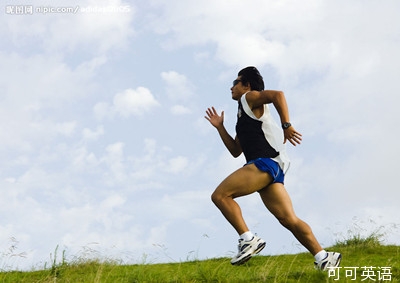(单词翻译:单击)
Don--Don, we're on the air.
嘿,唐,我们正在直播哦。
Sorry, Yael, just getting in some jumping jacks before work.
抱歉,雅艾尔, 只是在工作之前做些跳跃运动。
I don't want to be one of the quarter million Americans who die prematurely each year from conditions like diabetes, heart disease, and obesity.
我可不想成为身患糖尿病、心脏病、肥胖症每年过早死的那25万名美国人其中之一。
Oh brother, another segment about the benefits of exercise.
哦,兄弟,运动的好处还有另一个原因。
What's the big deal?
还有什么大不了的呢?
Isn't there medicine that takes care of these diseases?
药物不能治疗这些疾病吗?
Well, medication is great for stabilizing existing conditions,
嗯,药物有利于稳定现有的身体状况,

but it doesn't solve the underlying problems-and everybody knows that exercising is good for you.
但并不能解决根本问题,而且每个人都知道锻炼有好处。
Yes, but now scientists suggest that exercise is even more than that.
是的,但是现在科学家们表明运动还有更广泛的益处。
The theory is that humans are genetically programmed by evolution to be physically active.
该理论认为人类的身体活动决定自身的基因进化。
After all, our ancestors spent millions of years hunting and gathering and only the last few thousand years as cultivators.
毕竟,我们的祖先花了数百万年进行狩猎和采摘,而只有过去的几千年才作为庄稼人。
So cushy office jobs aren't natural?
那轻松的办公室工作不自然吗?
Right. So today, when we think of the average person, we think of someone who doesn't exercise.
是这样的。所以今天,当我们想到一般人,我们认为这是一个不运动的人。
And what these scientists are saying is that the biological norm is a person who is very active.
而这些科学家们想表明的是生理正常的人是非常有活力的人。
I'm not sure I see your point.
我不太我明白你的意思。
So instead of saying that exercising decreases your risk for certain health problems, it's more correct to say that not exercising increases your risk for those problems.
与其说锻炼会降低你患上特定疾病的风险,不如更准确的说不锻炼会增加患病的风险。
Your body expects you to exercise, and when you don't, your body is more likely to break down.
你的身体期望自身去锻炼,如果不锻炼身体会垮掉。
So when you do nothing, you're actually making things worse.
所以当你什么也不做的时候,其实是在让事情变得更糟。


